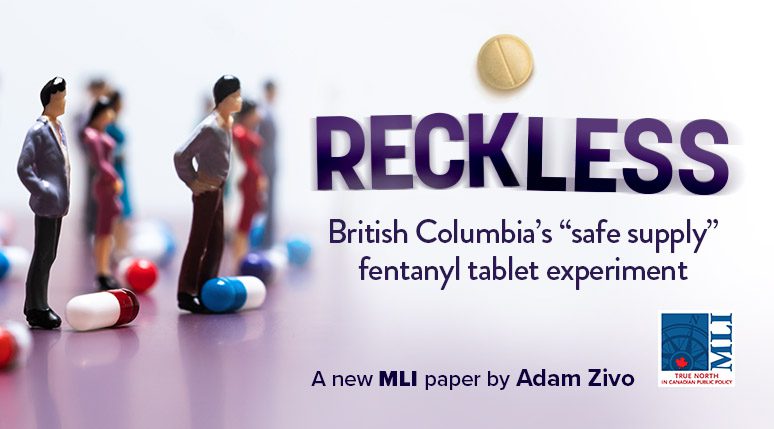By Adam Zivo
December 14, 2023
Executive Summary
This past August, British Columbia’s government quietly launched new protocols that allow doctors to prescribe “safer supply” fentanyl tablets and liquid sufentanil. Fentanyl is at least 10 times stronger than hydromorphone and sufentanil, which is derived from fentanyl, is a further 5 to 10 times more potent than its parent drug. While in theory these drugs could save lives if provisioned cautiously, the way the province has chosen to distribute these dangerous opioids is nothing short of reckless.
There is evidence to support the use of opioid agonist therapy (“OAT”) medications, such as methadone, buprenorphine, and slow release oral morphine in addiction treatment, but the government’s new protocols extrapolate OAT-related evidence to support “safer supply” fentanyl even though the two therapies have little in common. In fact, the government’s protocols stress that providing safer supply fentanyl or sufentanil is “not a treatment for opioid use disorder” and that “there is no evidence available supporting this intervention, safety data, or established best practices for when and how to provide it.” It is deeply concerning that the BC government has, over the past several years, significantly increased access to “safe” fentanyl and sufentanil despite openly admitting that there is no evidence showing that these interventions provide any benefits and can be implemented safely.
“Safer supply” programs claim to reduce overdoses and deaths by providing free pharmaceutical-grade drugs as alternatives to potentially tainted illicit substances. While safer supply sounds nice in theory, addiction experts have found that drug users are reselling (“diverting”) a significant portion of their free hydromorphone on the black market to purchase harder substances. This has fuelled new addictions while generating handsome profits for organized crime. Some patients have even been coerced into securing safer supply they didn’t need. Pimps and abusive partners pressure vulnerable women into securing as much hydromorphone as possible for black market resale. Other vulnerable patients, such as the geriatric and disabled, have been robbed of their safer supply outside of pharmacies.
There are other issues with the protocols, too. They require that clients be told that their access to free fentanyl and sufentanil will almost certainly be cut off if they are hospitalized, or if they attend withdrawal management or substance use treatment facilities. This creates powerful disincentives for drug users to seek life-saving health care. Further, none of the safer supply protocols by the British Columbia Centre on Substance Use (BCCSU) discuss the rights and roles of the parents of minors struggling with addiction. It appears that health care providers can give fentanyl and sufentanil to minors regardless of whether parents are aware of, or consent to, this intervention. The protocols do not specify a minimum age for safer supply clients.
It would not take much to reshape BC’s safer supply fentanyl and sufentanil programs into something more responsible and genuinely safe. There is nothing preventing the province from redesigning safer supply as a recovery-oriented intervention. Experts argue that safer supply could be helpful if used as a temporary intervention that helps severely-addicted users make the transition to recovery-oriented treatments, such as OAT.
There is also nothing stopping the province from fixing many of the issues with the safer supply program – including lax safeguards for youth. Any safer supply model must require supervised consumption. It is the absence of this supervision that has enabled the mass diversion of safer supply drugs onto the black market.
Governments have a duty to provide evidence-based treatment to vulnerable citizens and consider collateral harms to others. Rather than fulfil this duty, the BC government is committing to risky and highly experimental interventions that lack an appropriate evidence base.







